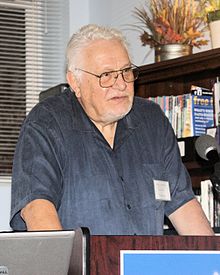
Scientists and science organizations are being disingenuous when they say science can say nothing about the supernatural. They know better. Their policy of appeasing religion for presumably political reasons only empowers those who are muddling education and polluting public policy with anti-scientific magical thinking.
His article is Science and Religion. I was alerted to it through Jerry Coyne’s post on Why Evolution Is True.
Stenger opens with
I find it surprising that most scientists, believers and nonbelievers alike, refuse to apply their critical thinking skills to matters of religion. . . . . Scientists prefer to follow Stephen Jay Gould’s dictum that science and religion occupy two “non-overlapping magisteria.”
That, of course, means individuals are required to leave moral and ethical questions to “scholars who interpret ancient texts.” Provocative Stenger opines that such a situation sounds to him like “Sharia law”. Moral behaviour certainly is observable and a matter of scientific understanding. (It was my own realization that all social animals have “moral codes”, including punishments meted out to those who break them, that helped me on my own journey towards atheism.)
Stenger addresses two (of several) types of scientific experiments that have been conducted to test what should be the observable effects of the supernatural on the natural world: the phenomena of answered — or unanswered — prayer and near-death experiences.
Check the article for the details.
If you enjoyed this post, please consider donating to Vridar. Thanks!

Stenger’s latest book, “God and the Folly of Faith” is really good.
http://www.amazon.com/God-Folly-Faith-Incompatibility-Religion/dp/1616145994/ref=sr_1_1?s=books&ie=UTF8&qid=1337177966&sr=1-1
Neil typed> “It was my own realization that all social animals have “moral codes”, including punishments meted out to those who break them, that helped me on my own journey towards atheism.”
Last winter I was walking my dog in a local park. As we approached an empty soccer field, I observed five crows pecking and feeding on the dormant brown grass. As soon as the birds saw me, they took flight. All then dive bombed onto their companion who was perched high in a large oak on the opposite side of the field. The crow in the tree did not vocalize any sound as it observed me and my dog approaching. I can only speculate, but it seems the five crows that had been feeding were punishing their fellow for not sounding the alarm at my approach. Crows are understandable leery of humans due to how we almost always view they as pests and seek to shoot them.